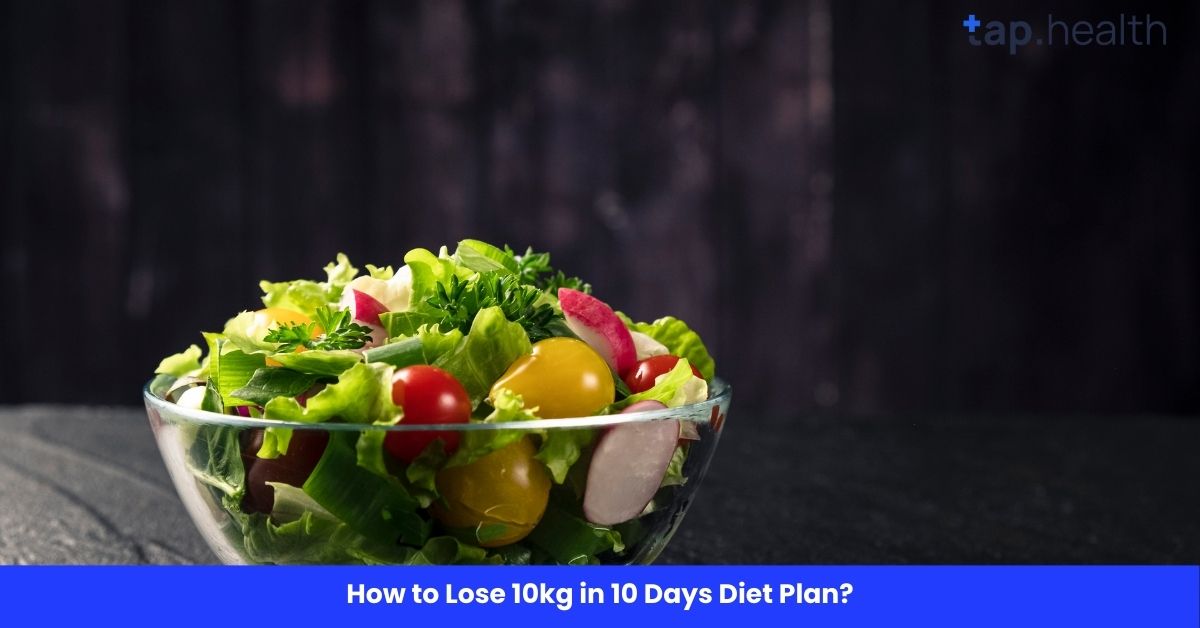Yes, losing 10kg in 10 days is technically possible, but most of the drop comes from water weight, glycogen depletion, and some muscle—not pure fat. To lose 1kg of actual fat, you need a 7,700-calorie deficit. For 10kg of fat alone, you’d need a 77,000-calorie deficit in 10 days (7,700 cal/day), which is nearly impossible without extreme measures that harm health.
Realistic rapid weight loss in 10 days usually ranges from 4–8kg for most people when combining severe calorie restriction, low-carb eating, and intense training—mostly water and glycogen.
Risks of Extreme Rapid Weight Loss
Quick weight loss carries serious risks:
- Muscle loss and slower metabolism
- Nutrient deficiencies and fatigue
- Gallstones and electrolyte imbalance
- Hair loss, dizziness, and mood swings
- High chance of rebound weight gain
Always consult a doctor before attempting such an aggressive plan.
Safe & Effective 10-Day Diet Plan to Maximize Weight Loss
Core Principles
- Calorie intake: 1,000–1,300 kcal/day (women), 1,200–1,500 kcal/day (men)
- Very low carb (<50g/day) to deplete glycogen and drop water weight
- High protein (1.6–2.2g per kg body weight) to preserve muscle
- Intermittent fasting 16/8 or 18/6
- Drink 4–5 liters of water + green tea daily
Daily Meal Structure (Example for Women ~1,200 kcal)
Breakfast (skip or black coffee/tea) – Start eating window at 12 PM Lunch (12 PM):
- 150g grilled chicken breast or fish
- Unlimited non-starchy vegetables (spinach, broccoli, cucumber, zucchini)
- 1 tbsp olive oil or 30g avocado
Snack (3 PM):
- Protein shake (25–30g whey isolate) or 2 boiled eggs
- Handful of berries
Dinner (6–7 PM):
- 150g lean protein (turkey, tuna, tofu, or white fish)
- Large salad with lemon juice or apple cider vinegar
- Optional: 50g sweet potato or ½ cup quinoa if energy crashes
Before bed: Herbal tea or detox water with lemon
Foods to Eat
- Lean proteins: chicken breast, turkey, fish, egg whites, tofu
- Low-carb vegetables: leafy greens, broccoli, cauliflower, zucchini, cucumber
- Low-sugar fruits: berries, lemon
- Healthy fats: small amounts of avocado, olive oil, nuts (10–15g)
Foods to Avoid Completely
- Sugar, bread, pasta, rice, potatoes
- Alcohol, soda, fruit juice
- High-sugar fruits (banana, mango, grapes)
- Processed foods and dairy (except whey isolate)
Best Exercise Plan for Fast Results
Day 1–10 Daily Routine:
- Morning (fasted): 30–45 min brisk walking or light cardio
- Afternoon/Evening: 30–40 min HIIT (sprints, burpees, kettlebell swings)
- 3–4 days/week: Full-body strength training (squats, push-ups, rows) Total extra burn: 500–800 kcal/day
Hydration & Detox Tips for Quicker Water Loss
- 4–5 liters water daily
- Green tea (3–4 cups) – boosts metabolism
- Apple cider vinegar (1 tbsp in water before meals)
- Dandelion or parsley tea to reduce bloating
- Salt under 1,500mg/day to minimize water retention
Sleep & Stress Management
- Sleep 7–9 hours nightly – poor sleep raises cortisol and stalls fat loss
- 10-minute meditation or deep breathing daily
Real Results People Achieved in 10 Days
- Emma (32F): Lost 7.5kg – low-carb + 16/8 fasting + daily HIIT
- Alex (27M): Lost 9.5kg – 1,200 kcal PSMF-style + heavy lifting + sauna Most regained 2–4kg water weight within a week after resuming carbs.
Expert Advice on Rapid Weight Loss
Nutritionists and doctors agree: losing more than 1kg of fat per week is rarely sustainable or healthy. Use a 10-day aggressive phase only if absolutely necessary (wedding, photoshoot, medical reason) and immediately transition to a moderate deficit afterward.
Key Takeaways for Safe 10kg Weight Loss Attempt
- Expect 60–80% of the loss to be water and glycogen
- Prioritize protein and strength training to spare muscle
- Stay hydrated and supplement electrolytes (magnesium, potassium, sodium)
- Plan a proper refeed and reverse diet after day 10 to avoid rebound
Can People with Diabetes Safely Follow a 10kg in 10 Days Plan on TapHealth?
No—extreme low-carb or very low-calorie plans can cause dangerous blood sugar swings, hypoglycemia, or ketoacidosis in people with diabetes. Always work under medical supervision and continuous glucose monitoring if you have diabetes. Platforms like TapHealth offer doctor-designed, diabetes-friendly gradual weight loss plans that are far safer and more sustainable than any 10-day crash diet.se regimen to ensure it’s safe for you.
Also read this : Diabetes and Frostbite: A Higher Risk Than You Realize
References:
- Harvard T.H. Chan School of Public Health, “The Nutrition Source: Healthy Weight,” Harvard.edu



